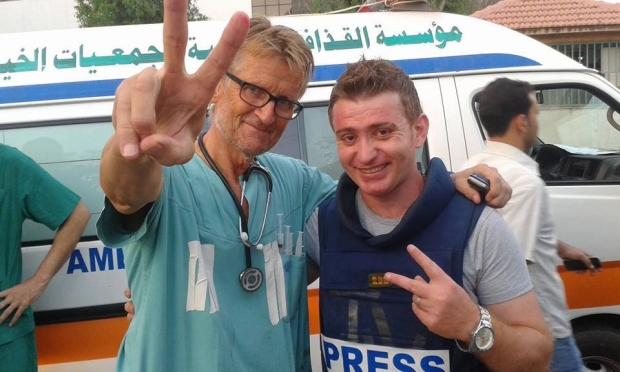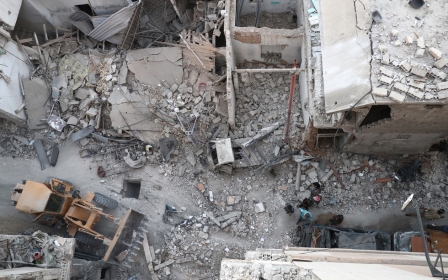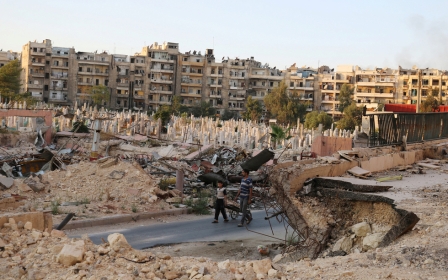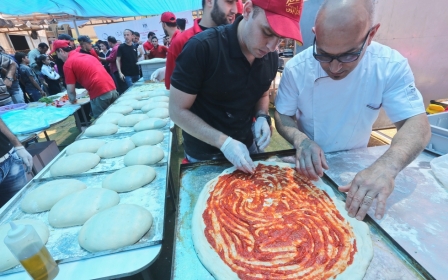A new start for a chef from Aleppo... in Gaza
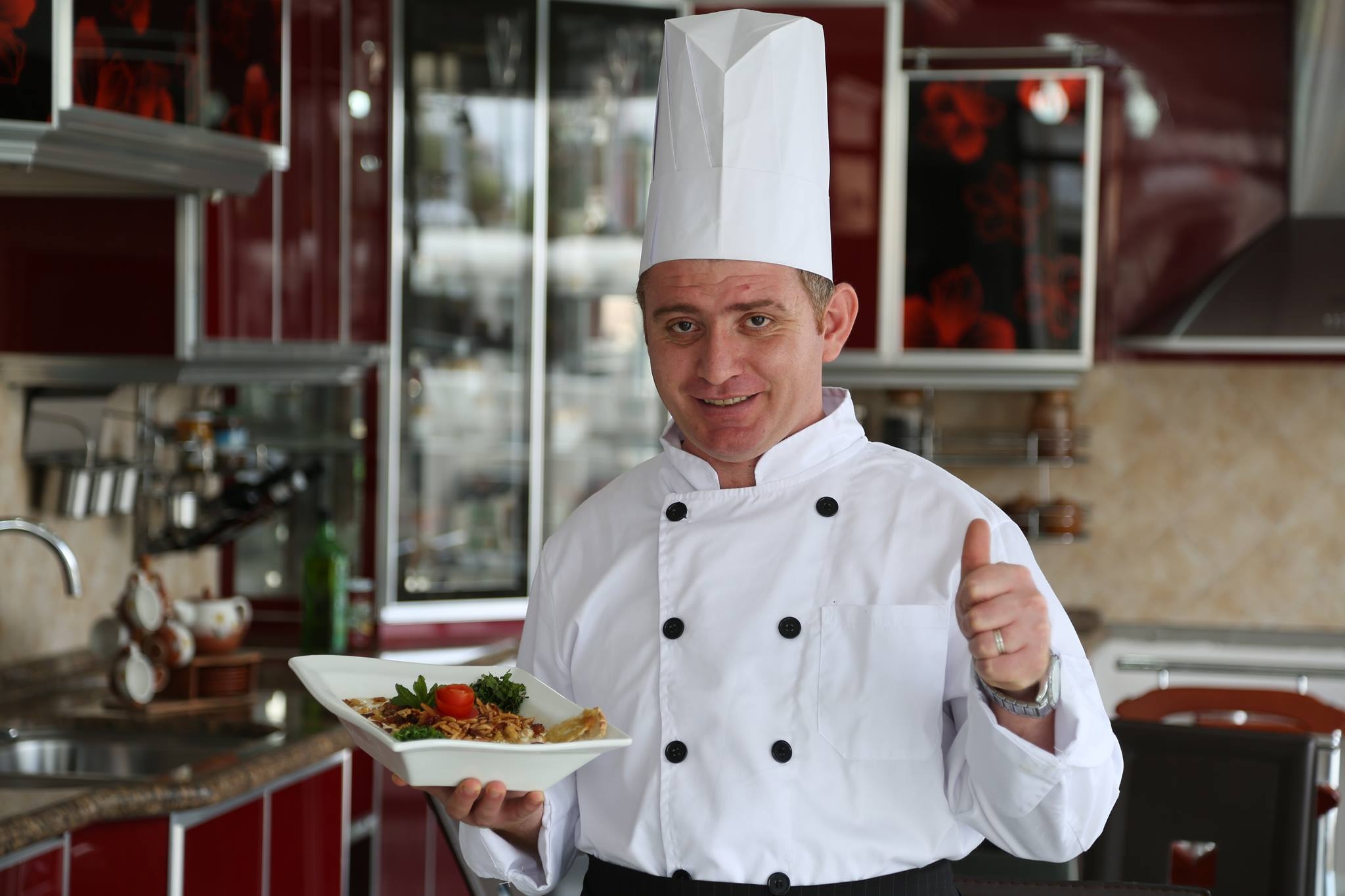
GAZA STRIP - The Aleppo that Wareef Hamedo remembers and loves is far removed from the tragic images he sees on the news today. In today's Aleppo, hospitals have been bombed, doctors are overwhelmed and since 19 September alone when a US-Russia negotiated truce broke down, the total death toll has climed to at least 400 people, including more than 100 children.
What Hamedo dreams about is Aleppo “during the peaceful days”.
“I remember the call of the licorice and vegetable peddlers outside my window, the smell of fresh Saj [flatbread made on domed metal griddles], the friendly voices of my neighbours,” says Hamedo, who today is among 22 Syrian refugee families who found a new home in the Gaza Strip - as crazy as that sounds.
Life in Syria was good for Hamedo, a chef at a traditional Syrian restaurant called the Melaas Café. Although he had studied mechanical engineering in university to please his father, cooking had been his main love ever since he found a job in a kitchen at the age of 15. His hobby, which quickly turned into a profession, took him to Latakia, Damascus, Homs and Cairo; but Aleppo was always his home.
That is, until the civil war broke out. Business plummeted, and the increasing attacks forced the restaurant to close. Then came the attack that scattered his family.
“It was 6pm,” Hamedo shudders. “I was with my brother on the second floor of our house. I was sitting on the balcony and he was lying on the floor beside me. We heard a sudden, high whistle followed by an explosion. The whole neighbourhood lit up. We ran into the street barefoot. Women were screaming. We discovered that our neighbours’ house had been hit. Our neighbours, a mother and two children, were on the floor, covered with blood. We could see right away that one of the children was dead and we carried the other two to a car so that another neighbour could take them to the hospital. But then we learned the mother was dead as well.”
Breaking into Gaza
Not long after that, his siblings escaped to Turkey - both of his parents died before the war; Hamedo is the oldest child among 10 - but Hamedo held out. “My family was so afraid of another sudden attack. But I preferred to wait it out a little longer, and it was a relief not to have to worry about my brothers and sisters. In my heart, I prayed the fighting would end.”
It did not, however. And when the violence hit close to home again, he knew it was time to go.
“It was 4pm and I was with my cousin in front of a falafel shop,” he recalls “We’d been running short of bread for around two weeks so we went out to buy a falafel sandwich - which cost 125 Syrian lira, compared to 25 before all the fighting broke out. We were sitting on the stairs of the shop and our neighbour's son joined us. We finished eating and started on our way home. About five minutes later, we heard a shot. A sniper shot the neighbour's son in his eye."
'Syria will always be my mother and Aleppo my lover'
“It wasn't easy to leave Aleppo. I lack words to describe how painful that was. But death was the only other choice. I feel like I left my heart there. Syria will always be my mother and Aleppo my lover.”
Hamedo made the long trek to his uncle’s house by foot, then got a ride to the Turkish border to join his family. “But I couldn’t find work in Turkey. The language barrier, and my lack of money, made life too difficult. I didn’t know how I’d survive with any dignity.”
Hearing employment was more available in Arabic-speaking Egypt, he made the three-day voyage by sea, only to encounter rising anti-Syrian sentiment and poor working conditions.
Hamedo had two remaining options: pay a smuggler to take him on the dangerous journey to Europe by boat or go to Gaza, where a Palestinian friend he met in Cairo offered him a job at a restaurant. In May 2013, he entered Gaza through one of the smuggling tunnels.
“People thought I was crazy,” Hamedo admits, adding that he did not tell his family in Turkey that he was in Gaza until four months after he arrived. “I didn’t want them to worry... But Palestinians are the warmest people I have met; they make me feel like I belong, like I’m ‘home’ again.”
'Palestinians are the warmest people I have met; they make me feel like I belong, like I’m home again'
In fact, Hamedo was so welcome that he married a local Palestinian journalist. He met Maha Abualkass when she interviewed him for a story on Syrian refugees, and they were married in May 2014. In September, their first child, Eilia'a, was born.
On Facebook, Hamedo dedicated this status to his new daughter: “With the help of YouTube, I will wash your little ears with the melody of the big mosque in Aleppo. I will show you every inch of the city. I will tell you stories about my village, and we will leaf through my family's photos. I will tell you everything about Syria and your mom will tell you everything about Palestine and Jerusalem.”
Different place, more war
However, life in Gaza has not been without its challenges, to put it mildly. Hamedo worked at his friend’s restaurant until Israel waged its 52-day war on Gaza in the summer of 2014. The restaurant closed and Hamedo spent the days accompanying his wife as a sort of “protector” as she reported her stories.
“Every single situation reminded me of my wounded Syria,” recalls Hamedo. “But it still was not as bad as what I lived through in Syria, where there were snipers on the streets and on building tops almost everywhere, and where there were abductions and rapes... There were never any warnings at all when bombs hit.”
The restaurant where Wareef had worked never re-opened and he has not found stable employment since. The UN Relief and Works Agency (UNRWA) has a strong presence in Gaza, but its mandate is to assist Palestinians, not Syrians, and thus can provide no aid.
Another issue for the Syrians is that Israel controls the population registry of the Gaza Strip. Since the Israeli government has historically not maintained relations with Syria’s Bashar al-Assad's government, they are, perhaps, even more stateless in Gaza than anywhere else. Without them being on the population registry, local governmental agencies and even international organisations find it difficult to document and offer aid to Syrians in Gaza.
According to Wafa al-Kafarna, the information, counselling and legal assistance project manager for the Gaza branch of the Norwegian Refugee Council, it is possible to leave Gaza through Egypt if the refugees have valid travel documents. However, the refugees say there is an agreement between Cairo and Damascus to return them for questioning. So for now, the Syrians will be staying in Gaza.
Not one to be defeated, Wareef still has dreams. His goal is to produce his own TV show and share his love of both Syrian culture and food with others. He demonstrates how to make traditional dishes on his own YouTube channel and is looking for support to take it to a higher level.
Additional reporting/translating by Basman Derawi.
This article is available in French on Middle East Eye French edition.
Middle East Eye propose une couverture et une analyse indépendantes et incomparables du Moyen-Orient, de l’Afrique du Nord et d’autres régions du monde. Pour en savoir plus sur la reprise de ce contenu et les frais qui s’appliquent, veuillez remplir ce formulaire [en anglais]. Pour en savoir plus sur MEE, cliquez ici [en anglais].


